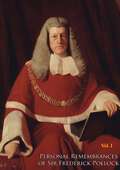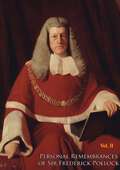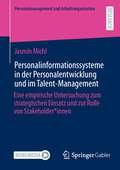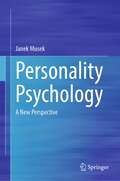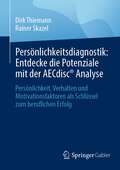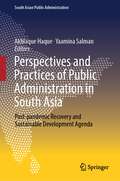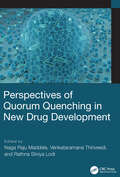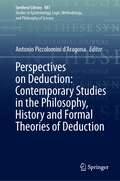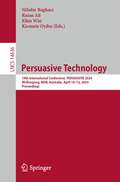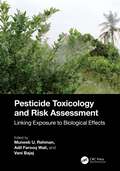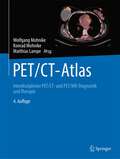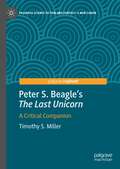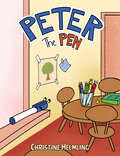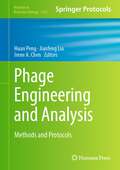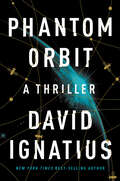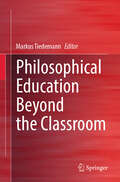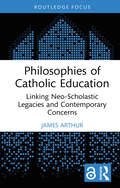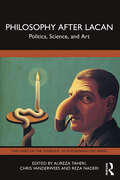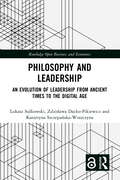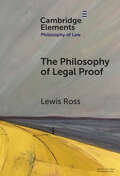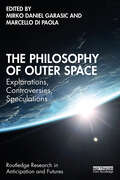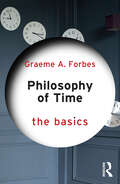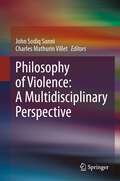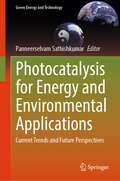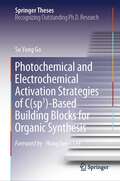- Table View
- List View
Personal Remembrances of Sir Frederick Pollock, Second Baronet, sometime Queen's Remembrancer Vol. I (Personal Remembrances of Sir Frederick Pollock #1)
by Sir Frederick Pollock"Personal Remembrances of Sir Frederick Pollock" offers an intimate glimpse into the life and times of one of the most distinguished legal scholars and historians of the 19th century. Sir Frederick Pollock, a prominent figure in English law, shares his personal recollections and experiences in this engaging memoir, providing readers with a rich tapestry of his professional achievements and personal anecdotes.The book chronicles Pollock's illustrious career as a barrister, judge, and legal writer, shedding light on his contributions to the development of common law and his influential role in legal education. Pollock's reminiscences are filled with vivid descriptions of his interactions with notable contemporaries, offering unique insights into the intellectual and social circles of Victorian England.Beyond his professional accomplishments, Pollock's memoir delves into his personal life, revealing the man behind the esteemed jurist. He reflects on his friendships, family, and the events that shaped his worldview. His narrative is characterized by wit, wisdom, and a deep appreciation for the nuances of human nature and society."Personal Remembrances of Sir Frederick Pollock" is more than just an autobiography; it is a historical document that captures the spirit of an era. Through Pollock's eloquent prose, readers are transported to a time of profound legal and social transformation. This book is an invaluable resource for historians, legal scholars, and anyone interested in the life of a remarkable figure whose legacy continues to influence the field of law.With its blend of personal reflection and historical context, "Personal Remembrances of Sir Frederick Pollock" provides a compelling portrait of a man who left an indelible mark on the legal landscape and offers timeless wisdom that resonates to this day.
Personal Remembrances of Sir Frederick Pollock, Second Baronet, sometime Queen's Remembrancer Vol. II (Personal Remembrances of Sir Frederick Pollock #2)
by Sir Frederick Pollock"Personal Remembrances of Sir Frederick Pollock" offers an intimate glimpse into the life and times of one of the most distinguished legal scholars and historians of the 19th century. Sir Frederick Pollock, a prominent figure in English law, shares his personal recollections and experiences in this engaging memoir, providing readers with a rich tapestry of his professional achievements and personal anecdotes.The book chronicles Pollock's illustrious career as a barrister, judge, and legal writer, shedding light on his contributions to the development of common law and his influential role in legal education. Pollock's reminiscences are filled with vivid descriptions of his interactions with notable contemporaries, offering unique insights into the intellectual and social circles of Victorian England.Beyond his professional accomplishments, Pollock's memoir delves into his personal life, revealing the man behind the esteemed jurist. He reflects on his friendships, family, and the events that shaped his worldview. His narrative is characterized by wit, wisdom, and a deep appreciation for the nuances of human nature and society."Personal Remembrances of Sir Frederick Pollock" is more than just an autobiography; it is a historical document that captures the spirit of an era. Through Pollock's eloquent prose, readers are transported to a time of profound legal and social transformation. This book is an invaluable resource for historians, legal scholars, and anyone interested in the life of a remarkable figure whose legacy continues to influence the field of law.With its blend of personal reflection and historical context, "Personal Remembrances of Sir Frederick Pollock" provides a compelling portrait of a man who left an indelible mark on the legal landscape and offers timeless wisdom that resonates to this day.
Personalinformationssysteme in der Personalentwicklung und im Talent-Management: Eine empirische Untersuchung zum strategischen Einsatz und zur Rolle von Stakeholder*innen (Personalmanagement und Arbeitsorganisation)
by Jasmin MichlJasmin Michl realisiert eine tiefgehende Untersuchung zum Einsatz von Personalinformationssystemen in der Personalentwicklung und im Talent-Management mit besonderem Fokus auf strategische Einsatzgebiete und die Rolle von Stakeholder*innen. Im Rahmen ihrer Analyse verbindet die Autorin Perspektiven unterschiedlicher Interessengruppen, um die zentralen Herausforderungen digitaler Einführungsvorhaben im Personalbereich für Unternehmen und ihre Mitarbeitenden herauszuarbeiten. Hierbei wird auf Grundlage eines Mixed-Methods-Ansatzes deutlich, dass die erfolgreiche Bewältigung von technologischen Einführungsprojekten in HR keine rein technische Frage darstellt, sondern vielmehr eine der organisationalen Rahmenbedingungen und der sozialen Transformation. Die Erkenntnisse der Untersuchung bieten einen Einblick in transformationale Bewältigungs- und Positionierungsprobleme von und in Organisationen und bieten eine Grundlage zur Erarbeitung von möglichen Handlungs- und Zielfeldern für die Praxis.
Personality Psychology: A New Perspective
by Janek MusekThis book integratively examines theories and models of the most essential findings of personality psychology with the aim of advancing personality knowledge. Since much empirical research is applied to very specific problems, the larger picture can get lost. Rather, this book starts from a coherent scientific theoretical framework, rather than presenting diverse theories of personality — phenomenological empirical, psychoanalytic behavioral, humanistic and cognitive perspectives — without enough critical examination. In this book, all theories, models and perspectives are reviewed and discussed within a unified theoretical framework of psychology Thus, historically and conceptually different models can be considered by scientific standards. Its insights will be highly relevant to academics, students and professional alike.
Persönlichkeitsdiagnostik: Persönlichkeit, Verhalten und Motivationsfaktoren als Schlüssel zum beruflichen Erfolg
by Dirk Thiemann Rainer SkazelDieses Buch zeigt mittels der AECdisc® Potenzialanalyse Schritt für Schritt auf, wie wir Stärken, Fähigkeiten und Motivationsfaktoren von Individuen erkennen, analysieren und nutzen können. Führungskräfte, Personalleiter und Unternehmer können mithilfe der Analyse die richtigen neuen Mitarbeitenden gewinnen und bestehende Kollegen fördern, sowie diese in gut funktionierenden Teams langfristig an das Unternehmen binden. Die Potenzialanalyse schickt die Anwender auf eine Reise zu sich selbst, auf der sie schrittweise erfahren, welche unbewussten Verhaltensmuster, Stärken und verbesserungsfähigen Kompetenzen sie haben.
Perspectives and Practices of Public Administration in South Asia: Post-pandemic Recovery and Sustainable Development Agenda (South Asian Public Administration)
by Yaamina Salman Akhlaque HaqueThis edited volume bridges the gap between theoretical underpinnings of South Asian public administration and practices on the ground to understand the future path of public administration in the region. The ten chapters highlight the post-covid contemporary trajectories of public administration and the civil society in Bangladesh, India, Pakistan, and Sri Lanka. In addition, each case study is tied to a relevant UN Sustainable Development Goal (SDG), using the SDG framework to provide useful insights for transfer of knowledge and learning within the South Asian region and highlight the “South- South” and “South-North” exchange. Illustrating the unique challenges and opportunities faced by South Asian countries post-pandemic, this volume will be of interest to scholars and students of public administration, governance, South Asian politics, and the SDGs.
Perspectives of Quorum Quenching in New Drug Development
by Naga Raju Maddela, Venkataramana Thiriveedi, Rathna Silviya LodiAntibiotic resistance in pathogen microorganisms is a major global concern, especially the formation of biofilms. Quorum quenching has been practically used to control biofilm growth, and this indicates a promising hope for the development of new drugs for the control of biofilm-forming pathogens. This book provides a single source of information about two issues: the biology of quorum sensing and quorum quenching, and the perspectives of quorum quenching in new drug development. The text covers the latest literature from the last ten years and insights into quorum quenching and its need in medicine as an anti-virulence strategy.Features: Exclusively focuses on quorum quenching and its ability to be used as an alternative to antibiotics in the control of multidrug-resistant pathogens. Reviews the latest literature and case studies of the last ten years in the field of quorum sensing and quorum quenching. Promotes a new approach to the development of the next generation of antibacterial drugs. In the wake of rising antibiotic drug resistance, it is crucial to develop an alternative approach to control bacterial infection diseases and quorum quenching appears to be a promising strategy in the development of new medicines.
Perspectives on Deduction: Contemporary Studies in the Philosophy, History and Formal Theories of Deduction (Synthese Library #481)
by Antonio Piccolomini D'AragonaThis book provides philosophers and logicians with a broad spectrum of views on contemporary research on the problem of deduction, its justification and explanation. The variety of distinct approaches exemplified by the single chapters allows for a dialogue between perspectives that, usually, barely communicate with each other.The contributions concern (in a possibly intertwined way) three major perspectives in logic: philosophical, historical, formal. The philosophical perspective has to do with the relationship between deductive validity and truth, and questions the alleged conclusiveness of deduction and its epistemic contribution. It also discusses the role of linguistic acts in deductive practice, and provides a cognitive-didactic contribution on how we may learn through deduction. In the historical perspective, the contributions discuss the ideas of some major historical figures, such as Bolzano, Girard, Gödel, and Peano. Finally, in the formal perspective, the mathematics of deduction is dealt with mainly from an intuitionistic-constructivist or proof-theoretic point of view, with focus on “ecumenic” or internalistic approaches to logical validity, on the nature and identity of proofs, and on dialogical setups.Chapter [14] is available open access under a Creative Commons Attribution 4.0 International License via link.springer.com.
Persuasive Technology: 19th International Conference, PERSUASIVE 2024, Wollongong, NSW, Australia, April 10–12, 2024, Proceedings (Lecture Notes in Computer Science #14636)
by Raian Ali Nilufar Baghaei Kiemute Oyibo Khin WinThis book constitutes the refereed post-conference proceedings the 19th International Conference on Persuasive Technology, PERSUASIVE 2024 held in Wollongong, NSW, Australia, during April 10–12, 2024. The 14 revised full papers and 8 short papers presented in this book were carefully reviewed and selected from 51 submissions. based on their content: methods for tailoring and personalization; persuasive design and applications, persuasive strategies; and persuasive technologies and ethics.
Pesticide Toxicology and Risk Assessment: Linking Exposure to Biological Effects
by Muneeb U. Rehman Adil Farooq Wali Vani BajajWith the emergence of new pesticide combinations and application methods, assessing their potential risks to non-target organisms and human well-being becomes paramount. Pesticide Toxicology and Risk Assessment focuses on the need and strategies for safe and efficient use of pesticides. It offers insights from toxicogenomics, enabling an understanding of the genetic and epigenetic factors influencing human susceptibility to chemical toxicity, thereby quantifying their impacts.This book underscores the significance of risk assessment methodologies considering real-time variables influencing pesticide exposure to the environment and humans. It provides comprehensive details about models designed to evaluate risks across a spectrum of scenarios, from worst-case to real-time situations, while outlining strategies to mitigate these risks proactively. Furthermore, this book delves into the critical need for conducting field studies, particularly in addressing innovative combinations and application techniques.Key Features:• Covers toxicogenomic insights, delving into genetic and epigenetic impacts on human susceptibility to chemical toxicity• Provides insight into necessary field studies for new pesticide approaches• Aids pesticide manufacturers with risk assessment and effective formulation insightsAs an aid for regulatory bodies, the book facilitates the evaluation of risks linked to both established and innovative pesticides, promoting informed decisions on usage by integrating risk reduction approaches. Simultaneously, it serves as a valuable guide for pesticide manufacturers, offering insights into using risk assessment tools to develop secure and effective pesticide blends. This guidance expedites the introduction of novel pesticides that are efficient and safe for various applications.
PET/CT-Atlas: Interdisziplinäre PET/CT- und PET/MR-Diagnostik und Therapie
by Wolfgang Mohnike Konrad Mohnike Matthias LampeDer PET/CT-Atlas in seiner 4. Auflage stellt eine konsequente Weiterentwicklung des erfolgreichen Buchkonzepts dar. Er soll Ärzten verschiedenster Fachrichtungen als Nachschlagewerk dienen, die Indikationsstellung erleichtern und den therapiesteuernden Einfluss der PET/CT bzw. PET/MR beleuchten.InhaltDas Buch ist in 5 Sektionen unterteilt – Grundlagen, Maligne Erkrankungen, Therapiemanagement, Benigne Erkrankungen und Zukunftstendenzen – innerhalb derer es eine Vielzahl inhaltlicher Neuerungen gibt, z. B.:- Grundlagen: Praktischer Leitfaden für die technische Konfiguration und klinische Anwendung- Benigne/maligne Erkrankungen: Berücksichtigung neurologischer und demenzieller Erkrankungen, neues Kapitel Tumoren der Schilddrüsen und Nebenschilddrüsen - Therapiemanagement: Rolle der PET in der onkologischen Chirurgie, Beurteilung des Ansprechens auf eine medikamentöse Tumortherapie, Potenzial der Theranostik- Zukunftstendenzen: Neue Tracer in der nuklearmedizinischen Diagnostik und Therapie, Möglichkeiten mit aktuellen Geräten, Entwicklung des ReimbursementsFür einen schnellen Überblick in allen Diagnostik- und Therapiekapiteln sorgt eine einheitliche Gliederung. Zahlreiche neue Fallbeispiele, praktische Tipps, die Darstellung der Erstattungssituation, Pitfalls und eine Take-Home-Message runden jedes Kapitel ab.In informativen und anschaulichen Beiträgen mit fast 1.000 Abbildungen beschreiben neben Fachärzten für Nuklearmedizin, Radiologie, Gynäkologie, Urologie, Chirurgie, Strahlentherapie uvm. auch Vertreter der Gesundheitspolitik, der geräteproduzierenden Industrie sowie Medizinphysiker und Radiochemikerdie vielschichtigen Aspekte der PET-Hybridbildgebung.HerausgeberProf. Dr. med. Wolfgang Mohnike Ärztlicher Direktor der ÜBAG MVZ DTZ am Frankfurter Tor/ MVZ DTZ am OZB Onkozentrum BerlinPriv.-Doz. Dr. med. Konrad Mohnike Ärztlicher Leiter des MVZ DTZ Berlin am Frankfurter Tor Dr. med. Matthias Lampe Ärztlicher Leiter des MVZ DTZ am OZB Onkozentrum Berlin
Peter S. Beagle's “The Last Unicorn”: A Critical Companion (Palgrave Science Fiction and Fantasy: A New Canon)
by Timothy S. MillerThis book assesses the work of one of the foundational figures of American fantasy, Peter S. Beagle. Through its focused analysis of The Last Unicorn, this study contextualises Beagle’s work in relation to the popularity of the fantasy genre, following its growing success in the aftermath of Tolkien’s The Lord of the Rings. In addition, through reference to the film adaptation of The Last Unicorn and also Beagle’s other works, this study highlights the author’s longevity and the influence that his metafictional and comedic work has had on contemporary fantasy.
Peter the Pen
by Christine HelmlingPeter is a whiteboard marker pen who sits on the shelf of the teacher’s whiteboard easel. He is alone and, at night, he often hears the chatter and giggles of the felt pens in a container on the children’s table. He longs to join them. But how can he? Peter is very lonely. One night something very magical happens, something Peter never ever dreamt would happen.
Phage Engineering and Analysis: Methods and Protocols (Methods in Molecular Biology #2793)
by Huan Peng Jianfeng Liu Irene A. ChenThis volume explores the latest developments in the study and application of phage biology. The chapters in this book are divided into five parts and cover topics such as phage display, selection, and evolution; genetic and chemical modification of phages; analyzing structures by electron microscopy; characterizing phage transcripts and proteins; and the biology of whole phages. Written in the highly successful Methods in Molecular Biology series format, chapters include introductions to their respective topics, lists of the necessary materials and reagents, step-by-step, readily reproducible laboratory protocols, and tips on troubleshooting and avoiding known pitfalls.Cutting-edge and comprehensive, Phage Engineering and Analysis: Methods and Protocols is a valuable resource that will help both expert and novice researchers - from backgrounds ranging from microbiologists to biophysicists to chemical engineers - further enhance their understandingof this important and evolving field.
Phantom Orbit: A Thriller
by David IgnatiusA subtle and masterful novel from a prescient voice on the cutting edge of spy literature. David Ignatius is known for his uncanny ability, in novel after novel, to predict the next great national security headline. In Phantom Orbit, he presents a story both searing and topical, with stakes as far-reaching as outer space. It follows Ivan Volkov, a Russian student in Beijing, who discovers an unsolved puzzle in the writings of the seventeenth-century astronomer Johannes Kepler. He takes the puzzle to a senior scientist in the Chinese space program and declares his intention to solve it. Volkov returns to Moscow and continues his secret work. The puzzle holds untold consequences for space warfare. The years pass, and they are not kind to Volkov. After the loss of his son, a prosecutor who’d been too tough on corruption, and Russia’s invasion of Ukraine, Volkov makes the fraught decision to contact the CIA. He writes: Satellites are your enemies, especially your own. . . . Hidden codes can make time stop and turn north into south. . . . If you are smart, you will find me. With this timely novel, Ignatius addresses our moment of renewed interest in space exploration amid geopolitical tumult. Phantom Orbit brims with the author’s vital insights and casts Volkov as the man who, at the risk of his life, may be able to stop the Doomsday clock.
Philosophical Education Beyond the Classroom
by Markus TiedemannDidactics of philosophy and ethics demands problem based orientation and relevance for real life experiences. However, excursions, extracurricular places of learning or 'outdoor education' have hardly been taken into account. A systematic exploration of possible cooperations, synergy effects or incompatibilities has not yet been carried out. The present volume attempts to close this gap and to create an initial basis for further research, testing and discussion. It is intended to make a contribution to teacher training at universities and study seminars as well as to exploratory research in subject didactics.
Philosophies of Catholic Education: Linking Neo-Scholastic Legacies and Contemporary Concerns
by James ArthurThis seminal volume takes an interdisciplinary approach to presenting an authoritative account of contemporary philosophies of Catholic education, intersecting the substantive boundaries of education, religious studies, philosophy, and theology to ultimately re-examine these philosophies and reinvigorate the authentic aspects of the Catholic educational endeavour.Against the backdrop of an increasingly volatile debate between liberal and conservative values within Catholic educational and theological settings, chapters provide a thorough and judicious blending of historical accuracy with contemporary urgency. Combining a diversity of knowledge and historical account – including discussion on Thomism, Christian existentialism, and ideologically oppositional philosophies – the book argues that philosophies of Catholic education are in a new process of evolution necessary in order to justify the aims and priorities of Catholic education.This book will be of value to academics, scholars, teachers, and researchers with an interest in Roman Catholicism and the philosophy of education. Those more broadly interested in exploring the intersection between education, philosophy, and religion will also find the volume of use.The Open Access version of this book, available at www.taylorfrancis.com, has been made available under a Creative Commons Attribution-Non Commercial-No Derivatives (CC-BY-NC-ND) 4.0 license.
Philosophy After Lacan: Politics, Science, and Art (The Lines of the Symbolic in Psychoanalysis Series)
by Alireza Taheri Chris Vanderwees Reza NaderiPhilosophy After Lacan: Politics, Science, and Art brings together reflections on contemporary philosophy inspired by and in dialogue with Lacanian theory.Rather than focus on the thinkers who came before Lacan, the editors maintain attention on innovations in contemporary philosophy that owe their emergence to complimentary, critical, direct, or tangential engagement with Lacan. This collection makes one of the first concerted efforts to expand discussions between psychoanalysis and more recent philosophical thinkers while gathering chapters by some of the leading philosophical voices of the present moment. With contributors from around the world, this book has international appeal and is unique in its emphasis on contemporary philosophies inspired or influenced by Lacan.Philosophy After Lacan will not only appeal to psychotherapists and psychoanalysts, but also to students and professors of philosophy, critical theory, psychology, politics, history, and literature.
Philosophy and Leadership: An Evolution of Leadership from Ancient Times to the Digital Age (Routledge Open Business and Economics)
by Łukasz Sułkowski Zdzisława Dacko-Pikiewicz Katarzyna Szczepańska-WoszczynaPhilosophy and Leadership is an ambitious exploration of leadership's philosophical underpinnings from antiquity to the AI-driven future. The book journeys through history, gleaning insights from eminent philosophers and contextualizing their teachings to leadership.The book's foundational premise lies in the symbiosis of philosophy and leadership. Philosophy provides the "why" that drives the practices and decisions in leadership. This intricate connection is unfolded from the teachings of Confucius on virtue and ethics to the contemporary dialogues of Judith Butler on leadership identity. The book also delves into the evolution of leadership concepts through various eras—medieval times highlighting religious and scholastic perspectives, the Renaissance juxtaposing Machiavellian pragmatism with More's utopian ideals, and the Enlightenment era underscoring the importance of duty, skepticism, and rationality. An exciting aspect of the narrative is the amalgamation of evolution and leadership. By drawing parallels between Darwin's natural selection and leadership dynamics or Bergson's vitalism and intuitive leadership, the authors present a merger of biological evolution with leadership's ever-evolving paradigms. Finally, the concluding chapters reside in envisioning the future and reflect upon the impending synergy between AI and leadership. They emphasize the importance of amalgamating philosophical wisdom with the promises and challenges brought about by AI.The book will guide readers from the philosophical epochs of yore to the AI-predicted leadership paradigms of the future. By intertwining the enduring wisdom of philosophers with the dynamic nature of leadership, this book serves as a beacon for anyone aspiring to lead in any era.
The Philosophy of Legal Proof (Elements in Philosophy of Law)
by null Lewis RossCriminal courts make decisions that can remove the liberty and even life of those accused. Civil trials can cause the bankruptcy of companies employing thousands of people, asylum seekers being deported, or children being placed into state care. Selecting the right standards when deciding legal cases is of utmost importance in giving those affected a fair deal. This Element is an introduction to the philosophy of legal proof. It is organised around five questions. First, it introduces the standards of proof and considers what justifies them. Second, it discusses whether we should use different standards in different cases. Third, it asks whether trials should end only in binary outcomes or use more fine-grained or precise verdicts. Fourth, it considers whether proof is simply about probability, concentrating on the famous 'Proof Paradox'. Finally, it examines who should be trusted with deciding trials, focusing on the jury system.
The Philosophy of Outer Space: Explorations, Controversies, Speculations (Routledge Research in Anticipation and Futures)
by Mirko Daniel Garasic Marcello Di PaolaThis volume provides a rigorous philosophical investigation of the rationales, challenges, and promises of the coming Space Age.Over the past decade, space exploration has made significant and accelerating progress, and its potential has attracted growing attention from science, states, businesses, innovators, as well as the media and society more generally. Yet philosophical theorizing concerning the premises, values, meanings, and impacts of space exploration is still in its infancy, and this potentially immense field of study is far from mainstream yet. This book advances outer space philosophy by integrating key scientific and societal debates sparked by recent developments in space research and activities with conceptual, existential, ethical, aesthetic, and political themes and concerns. It maps various regions of philosophical exploration, reflection, and speculation regarding humanity’s present and future emanations into outer space, to promote a broad, rich, and nuanced societal debate regarding this transformative enterprise, which is as stimulating as it can be disorienting.This book will be a fascinating read for academics, researchers, and students interested in philosophy, space studies, science and technology studies, future studies, and sustainability.
Philosophy of Time: The Basics (The Basics)
by Graeme ForbesWhat is time? Does it pass? Is the future open? Why do we care? Philosophy of Time: The Basics doesn’t answer these questions. It does give you an opinionated introduction to thinking a bit more deeply about them. Written in a way that assumes no philosophical background from its readers, this book looks at central topics in philosophy of time and shows how they relate to other time-related topics – from theoretical physics (without the maths!) to your own mortality. Additional questions include: In what way is time different to space? How long is the present? Does the Theory of Relativity show time doesn’t pass? What makes time have a direction or ‘arrow’? Can you be harmed by your own death? Allowing the reader to think more deeply about time, this book begins to untangle some of the most difficult knots in all of philosophy. It also provides practical advice to prospective time-travelers.
Philosophy of Violence: A Multidisciplinary Perspective
by John Sodiq Sanni Charles Mathurin VilletThis volume explores the role of violence generally but with specific reference to African concepts and themes, and the significance they have for social redress. The contributors interpret African concepts and themes to include accounts of violence, explicitly or implicitly construed from indigenous axiological resources like Ubuntu or personhood and from those works that are not African in origin but have become central in African moral, political and legal thought, such as Hannah Arendt’s On Violence and Walter Benjamin’s Critique of Violence. The volume contributes to moral philosophy, social philosophy, African philosophy, and political philosophy/theory. It situates itself within the Global South, specifically the African perspective, to explore, articulate, and defend (or even critique) African conceptions of violence. This volume also takes seriously the need to tap into the intellectual resource of the African and diasporic African episteme thruthinkers such as Steve Biko, Frantz Fanon and Reiland Rabaka. It appeals to students and researchers working in philosophy and related disciplines on violence in Africa and the postcolonial context.
Photocatalysis for Energy and Environmental Applications: Current Trends and Future Perspectives (Green Energy and Technology)
by Panneerselvam SathishkumarThis book presents the existing photocatalytic reactor design and the future developments and the progress needed for both solar light-driven hydrogen generation and environmental purification. The chapters discuss the renewable and commercial aspects of translucent polymer-linked heterojunction nanocomposites as visible light-responsive photocatalysts. Relevant to these areas, the field of growing interest in black-TiO2, perovskites, MXenes and their numerous applications are presented. The framework, structural features and the need of mesocrystals for solar light-driven photocatalysis are also included. The book also discusses the additional features of green chemistry-based synthesis of nanomaterials in order to reduce any secondary pollution that may be released in the environment due to unsafe disposal of solvents. In addition, the importance of bismuth-based nanophotocatalysts towards energy and environmental applications and their future development as alternative photocatalysts for the prevailing nanomaterials are presented. The book also touches upon the idea to generate green fuel hydrogen through photocatalytic and photoelectrochemical techniques. Overall the book highlights contemporary developments in the last decade, the future perspectives of photocatalysis and its application towards energy and environment.
Photochemical and Electrochemical Activation Strategies of C (Springer Theses)
by Su Yong GoThis book addresses novel C(sp3)-C(sp2) and C(sp3)-heteroatom bond-forming reactions. Two strategies are given in the book using photoredox or electrochemical methods. The first strategy describes that the hydroalkylation of alkynes via photoredox-mediated Ni/Ir dual catalysis produces trisubstituted alkenes as versatile synthetic building blocks for the synthesis of pharmaceutical agents and natural products. High regioselectivity and E/Z-selectivity were achieved by introducing silyl groups that can provide steric and electronic effects to these selectivities with extensive opportunities for post-functionalization.The second strategy enables the development of C(sp3)-heteroatom bond-forming reactions through the electrochemical activation of C(sp3)-B bonds. The bonding of heteroatoms to carbon atoms has been an enduring subject of investigation for organic chemists. The function of most molecules is mainly determined by heteroatoms attached to the carbon atom, althoughthe backbone structure of organic compounds comprises carbon fragments.
